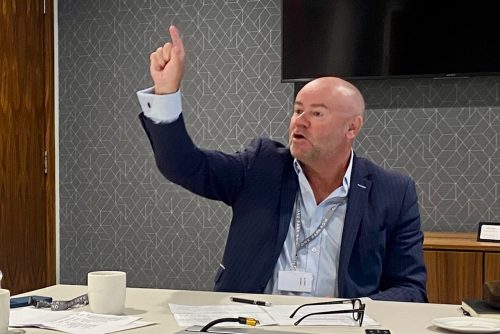Employers seek a truce in salary bidding wars

Employers are preparing for difficult conversations about pay after a heady period when a fluid job market drove up demand and salary offers.

A round table hosted by TheBusinessDesk.com and supported by Sellick Partnership brought together business owners and managers alongside senior people from professional services firms to share their experiences of the recruitment market and their expectations for the months ahead.
While inflation and cost-of-living pressures are ensuring that many people continue to look for a move that will result in a jump in pay, employers are being more cautious about getting caught in a bidding war.
Jon Bailey, who is the director of financial planning at Leeds Building Society, has had to make difficult decisions to let people leave rather than match offers.
“The challenge we have is where we have colleagues have opportunities to move externally, the pay rises people are going for at the moment are significant,” he said.
“You find somebody’s going for a 30-40% pay rise for a job that feels very similar. We’ll take a stance as a business to say the grass isn’t always greener and we’re not going to pay 30-40% more to stay.
“But it is a challenge where some of your best talent starts to face into that.”

Ben Priestley with chair Andy Staples
Ben Priestley is the finance director at air management specialists Mansfield Pollard in Bradford, which went through a management buyout that completed two weeks before the first lockdown.
He has seen an “inexorable rise” in people’s wages in the last 18 months as the economy emerged from the pandemic, but has also lost some individuals who received offers of significantly higher salaries that the company was not prepared to match.
Priestley said: “We aren’t, and cannot, as an SME play that game. I’ve said to them ‘I wish you all the best, and I completely understand why you want to leave’.
“But to switch from our structure is just bonkers because the knock on effect to everybody else in the team and then every other team is astronomical.”
The company, which employs 140 people, has since seen some of those leavers return.
“They realised they enjoyed the environment they worked in,” he said. “It was nice to see them back.”
Young employees who have entered the labour market in the last three years may have already benefitted from several pay rises, or significant jumps.

Mark Bailey, Sellick Partnership
Sellick Partnership’s group director Mark Bailey is seeing candidates who are looking to move for the first time but have “wild expectations” about what they can expect.
“They’re seeing the cost of living, they’re seeing headlines of massive increases, and many have seen those increases early in their career and seem to think that’s absolutely normal.
“So if they’re going to move, why wouldn’t they get 25%?”
Tim Bates, recruitment director at legal and professional services firm Knights, believes the market is “settling down” after a crazy period.
“12-18 months ago it was completely bonkers,” he said. “It had no rhyme or reason to it.

Pervinder Kaur, Addleshaw Goddard
“But I do feel as though individuals have settled a bit more into the new way of whatever it is that the business is working and how it’s working. It doesn’t seem as manic as it was
“Salaries in our area of professional services and legal have calmed down a bit. They’re still clearly going up and there’s a ripple effect, but they do seem to have settled slightly.”
Pervinder Kaur, head of Addleshaw Goddard’s Leeds office, added: “Whether you’re selling legal services or widgets, you’re part of that economy – and you can’t ignore the economy in which you operate.”







